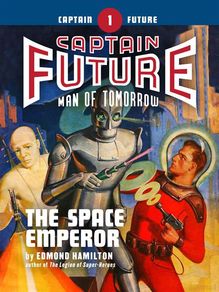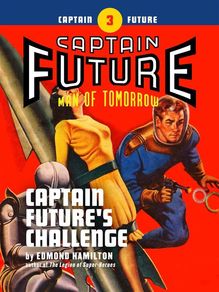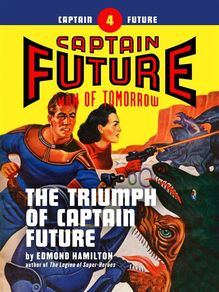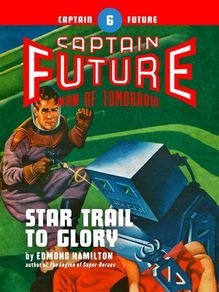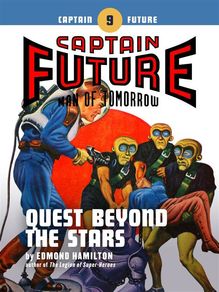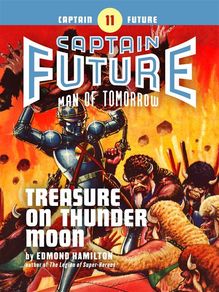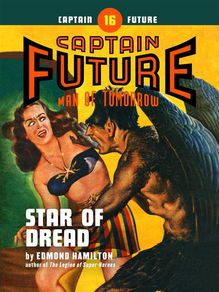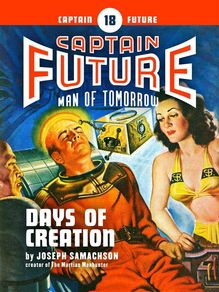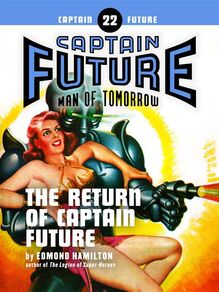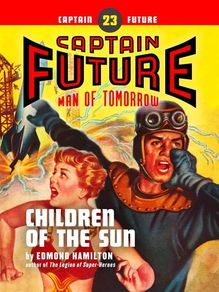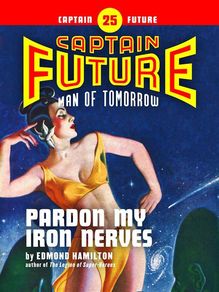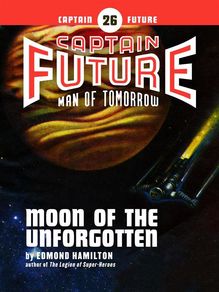-
 Univers
Univers
-
 Ebooks
Ebooks
-
 Livres audio
Livres audio
-
 Presse
Presse
-
 Podcasts
Podcasts
-
 BD
BD
-
 Documents
Documents
-
- Cours
- Révisions
- Ressources pédagogiques
- Sciences de l’éducation
- Manuels scolaires
- Langues
- Travaux de classe
- Annales de BEP
- Etudes supérieures
- Maternelle et primaire
- Fiches de lecture
- Orientation scolaire
- Méthodologie
- Corrigés de devoir
- Annales d’examens et concours
- Annales du bac
- Annales du brevet
- Rapports de stage
La lecture à portée de main
Vous pourrez modifier la taille du texte de cet ouvrage
Découvre YouScribe en t'inscrivant gratuitement
Je m'inscrisDécouvre YouScribe en t'inscrivant gratuitement
Je m'inscrisEn savoir plus
Vous pourrez modifier la taille du texte de cet ouvrage
En savoir plus

Description
The Captain Future saga follows the super-science pulp hero Curt Newton, along with his companions, The Futuremen: Grag the giant robot, Otho the android, and Simon Wright the living brain in a box. Together, they travel the solar system in series of classic pulp adventures, many of which written by the author of The Legion of Super-Heroes, Edmond Hamilton.
Sujets
Informations
| Publié par | Thrilling |
| Date de parution | 30 juillet 2018 |
| Nombre de lectures | 0 |
| EAN13 | 9788828366089 |
| Langue | English |
Informations légales : prix de location à la page 0,0007€. Cette information est donnée uniquement à titre indicatif conformément à la législation en vigueur.
Extrait
Outlaws of the Moon
Captain Future book #10
by
Edmond Hamilton
Curt Newton leads his valiant band of Futuremen in the thrilling campaign to preserve a priceless Lunar heritage!
Thrilling
Copyright Information
“Outlaws of the Moon” was originally published in 1942. No part of this book may be reproduced or utilized in any form or by any means, electronic or mechanical, without permission in writing from the publisher.
Chapter I
Lunar Secret
“CAPTAIN FUTURE is dead!”
The rumbling voice of the big green Jovian space-sailor rose above the laughter and chatter and clink of goblets, in this crowded Venusopolis spacemen’s café. He eyed his little knot of companions at the bar, as though challenging them to dispute him.
One of the hard-bitten spacemen, a swarthy little Mercurian, shook his head thoughtfully.
“I’m not so sure. It’s true that the Futuremen have been missing for months. But they’d be a tough bunch to kill.”
“I’ll say they would!” chimed in a lanky, blue Saturnian rocketeer. “Why, Captain Future and those three queer pals of his knew the whole System like the back of your hand.”
“Yes, but this time they went outside the System,” rumbled the big Jovian. “Out into uncharted interstellar space, God knows for what reason. And they’ve never come back.”
He drained his goblet of black Venusian swamp-grape wine, wiped his lips and delivered his final word.
“They’ll never come back, now. Everybody’s given up hope for them. Somewhere, somehow, they met their deaths out there among the stars.”
“I tell you, Captain Future is dead!” Albert Wissler said with vehement emphasis to the pilot of the little space-cruiser, bearing the two Earthmen toward the Moon.
It was almost as though Wissler was trying to convince himself. The thin, middle-aged scientist had a faint uneasiness in his bony gray face and blinking eyes. As he sat there in the co-pilot’s chair, his fingers were knotted together nervously in his lap.
“There’s no danger in this with the Futuremen gone for good. Strike,” he repeated to the pilot.
Gil Strike, the pilot, a hawk-eyed young fellow with a mean face, shifted the space stick slightly before he answered.
“If those four devils did come back, and found us fooling around the Moon—” he began.
“Oh, you’re dodging shadows,” retorted Wissler impatiently. “The Futuremen may have been something to fear when they were alive. But their ghosts can’t hurt us!”
“I still wish I hadn’t let you talk me into this,” muttered the pilot, staring ahead with an uneasy frown.
Framed in the bridge window of their little craft, the Moon bulked big ahead. Most of its earthward face was in shadow, but the western limb was a dazzling scimitar of light. Upon that narrow illuminated sector stood out boldly the black blot of the Mare Crisium and the towering ringed peaks of Langrenus and Petavius.
Their ship fell toward the shadowed sphere. This nighted face of the great satellite was bathed in an uncanny green glow. It came from the great green globe of Earth, hanging in the starry heavens overhead. The iridescent light lent an added weirdness to the lunar landscape over which they flew.
The pilot’s hawk like eyes narrowed suddenly. “Just what do you expect to find there that’s so valuable, Wissler?”
“I’ve told you—the scientific secrets of the Futuremen!” exclaimed Wissler. “Future wasn’t just a mere space fighter and adventurer. He was a scientist, too, perhaps the greatest in the System. There’s been more than one rumor of his discoveries and inventions. If we found them—”
“We would appropriate the credit for them and get rich, eh?” said Strike sardonically. “Don’t spend the money yet, Wissler. I don’t see much chance of finding what you’re after, in all that.”
HIS thumb jerked toward the lunar landscape over which they were flying. Fifty miles below lay one of the wildest regions of the Moon, the tumbled, rocky wilderness of the great southwest crater region. In the green glow, the closely clustered craters were a forbidding spectacle.
And everywhere the lunar plains and deserts were cracked by deep fissures. It was known that far beneath them, the Moon was honeycombed by labyrinthine caverns and hollows caused by its unequal cooling ages ago. But daring men, who had attempted to explore the chasms on the surface of this dead world, had met death in the lunar landslides that were so fatally easy to cause.
Other early explorers, seeking to solve the baffling mystery of the perished Lunarian civilization, had themselves died on the glaring plains when their air supply became exhausted. The riddle of the Moon’s past seemed insoluble. There were apparently no valuable mineral deposits. So, from the earliest days of space travel, Earth’s wild satellite had been avoided and was still almost unvisited and unknown.
Strike muttered discouragedly.
“The Futuremen would have their home here well hidden. No one has any idea where it’s located.”
“We’ll find it,” declared Albert Wissler.
He had brought a delicate-looking instrument from a case. It had a needle mounted on a quadrant.
“This is a radioscope,” he told the pilot. “It’s extremely sensitive to the emanations of any radioactive substance. The thing is a recent invention.”
Strike frowned.
“What’s the good of prospecting for radium here? Everyone knows there’s no radium on the Moon. Future himself said so.”
“That’s just the point!” exclaimed Wissler. “There’s no natural radium deposit on the Moon. So if there’s any radium here, it must be in the Futuremen’s laboratory. They’d have some there for experiments.”
Strike looked at him with more respect.
“I get it now,” he muttered. “Wherever that instrument shows radium to be present, we’ll find the Moon laboratory?”
“That’s the idea,” nodded the thin scientist, blinking rapidly. “The radiograph is sensitive over a two-hundred-mile range. We’ll quarter back and forth over the surface till it shows something.”
He had brought a large Moon chart. Using it as a guide, the two men began their search of the lunar surface. The little cruiser flew northward at steady velocity, over the green-lit wilderness of craters. Clear to the northern pole of the satellite they flew, without the radiograph needle stirring.
Strike turned the little ship and flew south again on a more easterly course. Over the giant ranges of the Caucasus and Apennines they sped, close past the towering ramparts of Copernicus, on southward until they had passed over Tycho’s numerous battlemented peaks.
Wissler had watched the radioscope with nervous intensity, but its needle had not once moved upon the quadrant.
“Your idea’s good—except it doesn’t work,” came Strike’s sour comment. “How do you know Captain Future wouldn’t have rayproofed his place, so nobody could use this plan of yours to locate it?”
Wissler’s face fell.
“I hadn’t thought of that,” he admitted. “Maybe he did do that. But we’ll go on looking, anyway. We’ll try the other side.”
The pilot flew on southward past Tycho and they passed around to the other side of the Moon, the side that men had never seen until the beginning of space travel. This other side lay bathed in the blazing glare of the full lunar day. Its peak and plains and craters reflected the intolerable brilliance of the unsoftened face of the Sun.
“Fly north and we’ll quarter over this side in the same way,” Wissler said doggedly.
But the result was negative.
“Not a quiver of the needle,” murmured Wissler, blinking discouragedly at the radioscope.
“Your plan’s a washout—Future’s Moon laboratory must be rayproofed,” muttered Strike. He looked uneasily across the scorching, savage wilderness. “Let’s get away from this devilish world!”
“Not yet,” pleaded Wissler. “There’s Great North Chasm ahead—let’s try it. The Moon laboratory might be hidden down in it.”
The tough young pilot’s uneasiness increased.
“I’m not going to fly down into that ghastly hole! I’ve heard old stories—”
“Just superstitious legends,” sniffed the scientist. “All right, fly over it from this height, if you’re scared.”
The greatest wonder of the Moon was coming into view ahead. From east to west, for eight hundred miles across the barren lunar plain, extended a colossal, yawning chasm. It was forty miles wide. Its sheer rock sides dropped down into a darkness of unguessable depths.
Twenty miles, Wissler knew, was the average depth of Great North Chasm. Its bottom was a realm of perpetual, freezing darkness. But long ago the first space pioneers had explored it, and had found in it those remnants of strange and ancient lunar civilization that had given rise to so many superstitious tales.
“Good Lord, look at that!” yelled Wissler suddenly, his eyes bulging at the radioscope.
The needle of the instrument had begun to jerk in ever more agitated fashion on its quadrant dial, as they flew toward the great canyon.
“That means radium somewhere down there ahead!” exclaimed Strike excitedly. “Then we’ve found the Moon laboratory’s location?”
“No—we haven’t,” blurted Albert Wissler, through lips stiff with amazement. “No small amount of radium such as Future’s laboratory might contain could cause this on the radioscope!”
He stared at the pilot, his pale eyes blinking rapidly. “Only a great natural deposit of radium down under the lunar crust could cause this!”
“Impossible!” exclaimed Strike, startled. “Captain Future himself always said there was no radium on the Moon.”
“Future said that, and made the System believe it, but he was either lying or didn’t know about this deposit!” Wissler cried.
His thin face was flushed with overpowering excitemen
-
 Univers
Univers
-
 Ebooks
Ebooks
-
 Livres audio
Livres audio
-
 Presse
Presse
-
 Podcasts
Podcasts
-
 BD
BD
-
 Documents
Documents
-
Jeunesse
-
Littérature
-
Ressources professionnelles
-
Santé et bien-être
-
Savoirs
-
Education
-
Loisirs et hobbies
-
Art, musique et cinéma
-
Actualité et débat de société
-
Jeunesse
-
Littérature
-
Ressources professionnelles
-
Santé et bien-être
-
Savoirs
-
Education
-
Loisirs et hobbies
-
Art, musique et cinéma
-
Actualité et débat de société
-
Actualités
-
Lifestyle
-
Presse jeunesse
-
Presse professionnelle
-
Pratique
-
Presse sportive
-
Presse internationale
-
Culture & Médias
-
Action et Aventures
-
Science-fiction et Fantasy
-
Société
-
Jeunesse
-
Littérature
-
Ressources professionnelles
-
Santé et bien-être
-
Savoirs
-
Education
-
Loisirs et hobbies
-
Art, musique et cinéma
-
Actualité et débat de société
- Cours
- Révisions
- Ressources pédagogiques
- Sciences de l’éducation
- Manuels scolaires
- Langues
- Travaux de classe
- Annales de BEP
- Etudes supérieures
- Maternelle et primaire
- Fiches de lecture
- Orientation scolaire
- Méthodologie
- Corrigés de devoir
- Annales d’examens et concours
- Annales du bac
- Annales du brevet
- Rapports de stage
